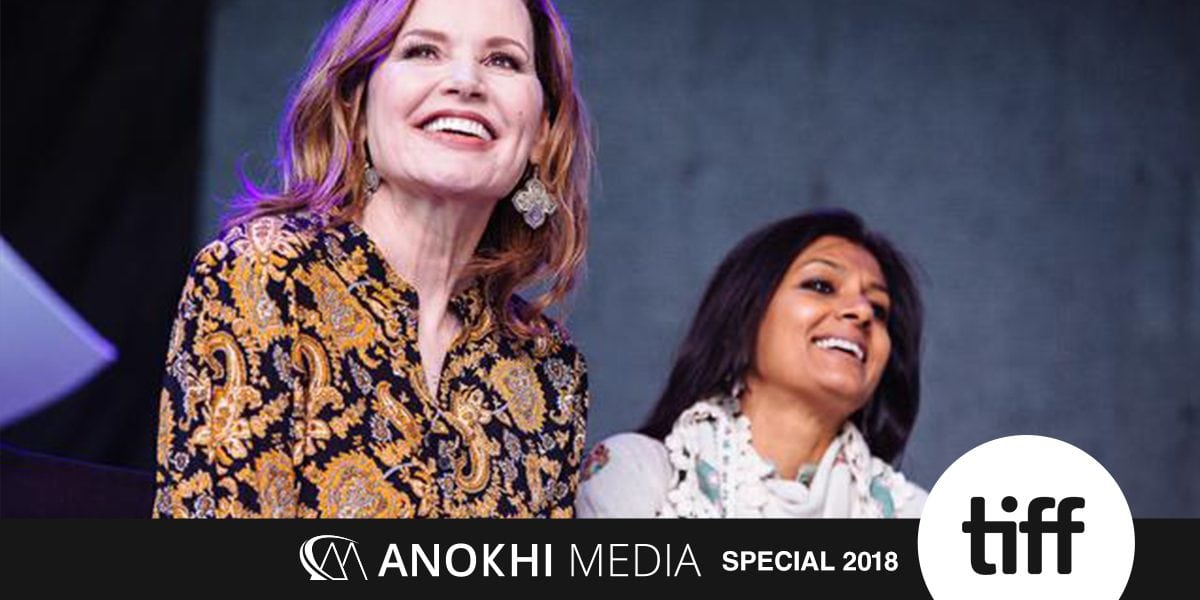
Yes She Can! TIFF 2018 Makes Momentous #PressForProgress Statement With #ShareHerJourney
Lifestyle Sep 10, 2018
Nearly a year after the #MeToo (anti-sexual harassment movement) and subsequent #TimesUp (move to tackle systemic inequality within the workplace) crusades, women in the entertainment industry, and in the world at large, have been increasingly under a microscope. TIFF 2018 makes momentous #PressForProgress statement with #ShareHerJourney.

Since International Women’s Day, there has been a louder than ever call to action for gender parity and fight for women’s progress, safety, and empowerment.
In particular, The Toronto International Film Festival (TIFF), which runs from September 6-16, according to Indie Wire, has embodied the call to action to do more and has been leading the charge for change as a result. In fact, TIFF seems to be ahead of the game as, in summer 2017, they actually kicked off their “…$3 million Share Her Journey campaign, a five-year funding plan that offers three-month residency programs for up-and-coming female creators.” In fact, Indie Wire notes that TIFF organizers have vowed to “…prioritize gender parity with a focus on mentorship, skills development, media literacy, and activity for young people.”
But, TIFF’s efforts run deeper as, in 2016, Indie Wire highlights that they achieved “… a 50/50 gender split in selected participants for a number of their Talent Development initiatives including Talent Lab, Studio, and TIFF Rising Stars.”
The Toronto International Film Festival
TIFF 2018 has been historic for women, in its own right, for a multitude of reasons that are crucial to recognize and celebrate.
First, throughout 2018, the Artistic Director and Co-Head, Cameron Bailey, and Director of Programming, Kerri Craddock, have continued to demonstrate the forward-thinking nature of the festival by hiring “13 women (and nine men) as fest programmers and…nearly 200 more film writers and critics to support underrepresented voices at major film events.”
In addition, this past weekend, according to Indie Wire, Bailey was set to “sign a widely publicized gender parity protocol, aka 50/50 x 2020. Festivals who sign must compile and release statistics for both gender and race as they apply to film submissions (for directors and, on occasion, also for cast and crew). The protocol also extends to festivals’ programming and executive boards.” This protocol will be crucial to seeing a higher representation of voices and visions at future festivals in Toronto, which is a necessary step when pushing for change holistically that will be most impactful as it unites more voices and enriches the conversation.

L’Oréal Paris Canada: #WorthIt Show
That said, TIFF’s progressive attitude has provided a platform for female voices at various events that were organized in partnership with the festival.
For instance, on September 7th, 2018, “L’Oréal Paris Canada, the Official Beauty Sponsor for the 43rd Toronto International Film Festival (TIFF), debuted the #WorthIt Show in Canada.” The #WorthIt Show began at the Cannes International Film Festival and provides an opportunity for “…women in the film industry” to express themselves.
The panel consisted of L’Oréal Paris spokeswomen Andie MacDowell and Amber Heard, along with TIFF’s Share Her Journey Ambassador, Shohreh Aghdashloo. At TIFF, the show doubled in its purpose, as it garnered attention about its #WorthSaying campaign, which was launched in 2016 to encourage females to speak out on topics that meant something to them, outside of just cosmetics. As well, according to EBoss Canada, the show “support[ed] TIFF’s Share Her Journey program (#ShareHerJourney), that reinforces the values of inclusivity and empowerment.”
The interview was unique as it featured three equally fascinating women who hail from different walks of life and points of their lives, allowing them to offer varying perspectives on the challenges women in the entertainment industry are facing. In particular, Heard highlighted that the industry is oversaturated with men, with approximately 80%, while there is less than 30% of women.
Meanwhile, Aghdashloo noted her surprise at discovering that only 7% of directors in the United States are female, which is shocking since this is where cinema began. The interviewees also highlighted the importance of witnessing powerful leaders, like Hilary Clinton, who dare to rise up and step into roles that are outside of the ‘norm.’ They noted that seeing these examples ultimately serves as inspiration for women to realize that we too can dare to be dreamers and do more.

That said, all of these powerful women agreed that while change is happening, it’s critical for women to stick together in sisterhood. In fact, MacDowell, added that there is power in numbers, and women can achieve great things when they use their voices, collectively, to empower one another.
Share Her Journey Rally
On September 8th, 2018, TIFF held the Share Her Journey rally that over 200 people attended. While there is awareness, the common argument of many speakers was that “a lot more needs to be done to ensure the movie business is a safe and empowering place for women.”
There were many inspirational speakers who graced the stage at the event to raise awareness and share their plights for change, including:
- Geena Davis
- Dr. Stacy L. Smith
- Amanda Brugel
- Keri Putnam
- Mia Kirshner
- Amma Asante
- Cathy Schulman
- Nandita Das
- Zavia Forrest
Below we highlight a few of the prominent and powerful speakers at the rally:
Geena Davis: The seasoned actress shared her argument that the entertainment industry could be revolutionized “”overnight” if filmmakers and TV producers looked at the number of female characters on screen and made adjustments.” For Davis, who founded the Geena Davis Institute on Gender in Media, explained that she has been examining the numbers relating to “…female characters in movies and shows for children…” for over a decade. She noted that it’s important that these shows do their part to instill positive and gender-balanced messages (and casts), instead of trying to change the narrative in adulthood.



Mia Kirshner: Kirshner is a co-founder of the #AfterMeToo movement, which, according to CBC, seeks to “[improve the] culture, legislation and policies surrounding sexual misconduct in the workplace. She dropped a truth bomb during her speech, as reported by CBC, noting that there has been very little change following the #MeToo movement, particularly when examining “…the mechanisms around investigating sexual violence, workplace sexual violence in terms of what exists for survivors and bystanders.”
To combat this, Kirshner explained that #AfterMeToo will be introducing, according to CBC, “…a digital platform, dubbed “Rosa,” which is supposed to help survivors with a host of resources. These include helping women to find low-cost mental health support, and providing legal support” to women in need, in multiple languages, so that it is able to extend its reach.

Dr. Stacy L. Smith: Dr. Smith has extensively investigated the inequality that is ingrained in the entertainment industry, and highlighted the lack of representation of women during her talk, according to CBC:
- “Of the last 1,100 most popular films made in the U.S. the last 11 years, only four percent have female directors.
- Out of 1,223 directors in those 11 years, only eight were women of colour; four were black women, two were Asian women, only one was Latin American.
- Out of the top 100 films of 2017, there were only four leading or co-leading characters who were women of colour, all four were mixed race, yet 40 percent of the U.S. population comes from underrepresented racial or ethnic groups.
- Of 59,715 film reviews, less than four percent are written by women of colour.”
These statistics are staggering (I know my head is spinning thinking about it) and only reinforced her demand the need for a shift, which according to Dr. Smith, will require “…accountability, a sense of community and tenacity.”

So, What’s Next?
Moving forward, it will be interesting to see what progress is made within the entertainment industry for women. Though, the fact that these conversations are happening right now is a huge step in the right direction as we press for progress and set important precedents that women in other industries might benefit from in the future.
The time for change is now, and the hope is that the more voices are empowered to spread their message, the more the conversation will continue to grow. The point is that right now, more than ever, women need to stick together. But, let’s not forget that men are an important part of this conversation too, as the empowerment of women does not equal the disempowerment of men. Instead, “what is needed is political will; men and women who are sensitive to and committed to promoting gender equality for the overall benefit of society.”
Change is in the air. Breathe it in. What an exciting time to be alive. #AmIRight?!
Main Image Photo Credit: www.go.indiegogo.com
Devika Goberdhan | Features Editor - Fashion
Author
Devika (@goberdhan.devika) is an MA graduate who specialized in Political Science at York University. Her passion and research throughout her graduate studies pushed her to learn about and unpack hot button issues. Thus, since starting at ANOKHI in 2016, she has written extensively about many challe...













































































































